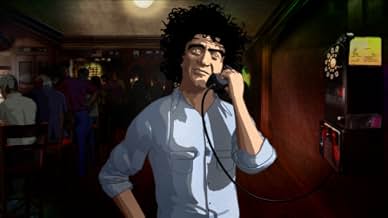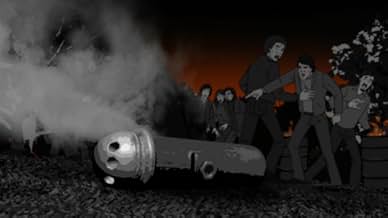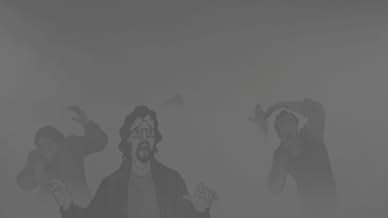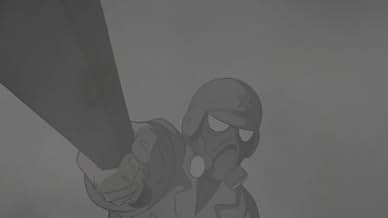PUNTUACIÓN EN IMDb
7,3/10
1,5 mil
TU PUNTUACIÓN
Añade un argumento en tu idiomaArchival footage, animation, and music are used to look back at the eight anti-war protesters who were put on trial following the 1968 Democratic National Convention.Archival footage, animation, and music are used to look back at the eight anti-war protesters who were put on trial following the 1968 Democratic National Convention.Archival footage, animation, and music are used to look back at the eight anti-war protesters who were put on trial following the 1968 Democratic National Convention.
- Premios
- 3 premios y 6 nominaciones en total
Hank Azaria
- Abbie Hoffman
- (voz)
- …
David Boat
- Norman Mailer
- (voz)
- …
Julian Rebolledo
- Reporter 2
- (voz)
- (as Julian Dean)
Daniel Hagen
- Bailiff
- (voz)
- (as Dan Hagen)
Roger Jackson
- Marshal 2
- (voz)
- (as Roger L. Jackson)
- …
Reseñas destacadas
In 1968 thousands of young people got angry and rioted as an unpopular President expanded an unpopular war overseas. As Ryan Harvey sung recently "The Times They *Aren't* A Chaning". The documentary footage from the protests is amazing, timely, and very reminiscent of news footage from recent political protests in North America. The animated sequences could have been better. They have the look of a very low budget show on Cartoon Network. Occasionally, a different kind of animation is used and this one is less realistic but much more effective. I'm not sure why this type of animation wasn't used throughout the trial sequences.
Roy Scheider I must add was very effective and creepy as Judge Hoffman, the authoritarian and one-sided judge who presided over the trial.
The movie is a reminder that things aren't changing but it's always important to fight.
Roy Scheider I must add was very effective and creepy as Judge Hoffman, the authoritarian and one-sided judge who presided over the trial.
The movie is a reminder that things aren't changing but it's always important to fight.
I just attended a screening of Chicago 10 at Sundance. Wow. What a unique and important movie. The mix of archival footage and animation blend together much better than I anticipated. The animated scenes are primarily courtroom scenes. The dialog during the animated courtroom scenes are taken directly from the court transcripts. The soundtrack is perfect. There is a combination of old and new including songs from contemporary artists such as Rage Against The Machine & Eminem. Although archival footage was used, and court transcripts were used as dialog, I'm not too sure that I'd call this film a documentary. This film was moving, powerful, and well worth seeing. I thought that the film was such a gem that I'm trying to get a tickets to see it again during the festival.
This is a really poorly movie. It may have been an interesting time in Amerikan history but this movie is far from interesting.
The makers chose to use really bad cartoons and actors to play the Chicago defendants. It doesn't work. The cartoons look nothing like the characters and their dialog is forced.
Frankly, a way better movie could have been made using only archival footage of the characters involved. It could have been truly compelling. Instead we got a really boring piece of celluloid that isn't even truthful to the events at hand.
Throughout the movie there are shots of the characters speaking to "crowds" and shots of massive numbers of people rallying. This is phony. It never happened. They inserted footage from other rallies to try to pretend these guys had such a following!
Shame on you.
And of course they never even mentioned that Jerry Rubin became a rabid capitalist after jail time ( I met him during his networking days in NYC) and Abbie Hoffman (who I always thought was the real deal) started dealing coke big time, went on the lam for years.
The makers chose to use really bad cartoons and actors to play the Chicago defendants. It doesn't work. The cartoons look nothing like the characters and their dialog is forced.
Frankly, a way better movie could have been made using only archival footage of the characters involved. It could have been truly compelling. Instead we got a really boring piece of celluloid that isn't even truthful to the events at hand.
Throughout the movie there are shots of the characters speaking to "crowds" and shots of massive numbers of people rallying. This is phony. It never happened. They inserted footage from other rallies to try to pretend these guys had such a following!
Shame on you.
And of course they never even mentioned that Jerry Rubin became a rabid capitalist after jail time ( I met him during his networking days in NYC) and Abbie Hoffman (who I always thought was the real deal) started dealing coke big time, went on the lam for years.
10kris-369
Just saw this at the Sundance opening. An absolute life changing film. There aren't words that could ever describe the feelings evoked by this extraordinary film. You could feel the heart and soul poured into every frame- and the mix of animation and incredible soundtrack was so moving. An absolute must see for anyone who needs to be reminded that they are the difference that is needed to stop the current war and the violence that is inherent today and since the beginning of time. This film leaves you feeling like standing up and taking flight and making a move toward what is truly important- the pursuit of peace and all that comes with-it- making a stand, courage, understanding yourself and your place in the world and knowing when to say when. I truly believe this film will change many lives.
The time: August 1968. The place: the Chicago Amphitheater, host to that year's Democratic National Convention. The event: the riots that broke out when an assortment of "hippies, yippees and just plain kids" took to the streets to protest the US' continuing involvement in the Vietnam War. The march and sit-in, originally billed as a "Festival of Life," turned violent when the ramped-up police and National Guard forces, estimated at well over 25,000 strong, began tear-gassing and billy-clubbing the demonstrators on the last night of the convention – in full view of the nation's citizens who watched in shock and amazement as it unfolded on their TV sets at home.
The demonstrations were largely organized by The National Mobilization Committee to End the War in Vietnam, from whose leadership ranks would come many of the men destined to go down in the annals of anti-establishment folklore as the Chicago 7 (the 10 of the title comes from the inclusion of Black Panther co-founder Bobby Seale, who had his trial severed, and the two lawyers). After the incident, these men were placed on trial, charged with conspiracy and with violating the Anti-Riot Act of 1968. All seven - David Dellinger, Tom Hayden, Abbie Hoffman, William Kunstler, Jerry Rubin, Rennie Davis and John Froines – were to wind up spending at least some time behind bars for their "crimes." Written and directed by Brett Morgan, the documentary "Chicago 10" blends amazing archival footage with animated re-enactments of the trial – based on actual court transcripts – with A-list actors like Hank Azaria, Nick Nolte, Mark Ruffalo, Roy Scheider and Liev Schreiber providing the voices.
The movie provides a fascinating glimpse into not only those turbulent times but the minds of the men who helped to bring them about. For instance, it's amusing to note how the defendants treated the trial itself almost as if it were some form of subversive street-theater, in the hopes of antagonizing the conservative judge, Julius Hoffman (they really DO seem to have gotten under his skin), and destroying the court's authority in the process. Also, in the months when the trial was going on, the defendants would fan out across the country on their off-hours, lecturing on colleges campuses – with most of the speaking fees going to defray the cost of the trial - raising awareness among the students and becoming counter-culture celebrities and spokesmen for a whole new generation of politically activated youngsters. Then the men would return to Chicago to resume their roles in the trial.
The final twenty minutes or so of the movie - as we watch the government forces move in to disperse the protesters and the subsequent chaos that ensued - are riveting and eye-opening to say the least. But the whole movie is engaging and informative and reminds us of just how fragile a thing the right to free speech and assembly can be even in a country that prides itself on that being the very foundation upon which its democracy is built.
The demonstrations were largely organized by The National Mobilization Committee to End the War in Vietnam, from whose leadership ranks would come many of the men destined to go down in the annals of anti-establishment folklore as the Chicago 7 (the 10 of the title comes from the inclusion of Black Panther co-founder Bobby Seale, who had his trial severed, and the two lawyers). After the incident, these men were placed on trial, charged with conspiracy and with violating the Anti-Riot Act of 1968. All seven - David Dellinger, Tom Hayden, Abbie Hoffman, William Kunstler, Jerry Rubin, Rennie Davis and John Froines – were to wind up spending at least some time behind bars for their "crimes." Written and directed by Brett Morgan, the documentary "Chicago 10" blends amazing archival footage with animated re-enactments of the trial – based on actual court transcripts – with A-list actors like Hank Azaria, Nick Nolte, Mark Ruffalo, Roy Scheider and Liev Schreiber providing the voices.
The movie provides a fascinating glimpse into not only those turbulent times but the minds of the men who helped to bring them about. For instance, it's amusing to note how the defendants treated the trial itself almost as if it were some form of subversive street-theater, in the hopes of antagonizing the conservative judge, Julius Hoffman (they really DO seem to have gotten under his skin), and destroying the court's authority in the process. Also, in the months when the trial was going on, the defendants would fan out across the country on their off-hours, lecturing on colleges campuses – with most of the speaking fees going to defray the cost of the trial - raising awareness among the students and becoming counter-culture celebrities and spokesmen for a whole new generation of politically activated youngsters. Then the men would return to Chicago to resume their roles in the trial.
The final twenty minutes or so of the movie - as we watch the government forces move in to disperse the protesters and the subsequent chaos that ensued - are riveting and eye-opening to say the least. But the whole movie is engaging and informative and reminds us of just how fragile a thing the right to free speech and assembly can be even in a country that prides itself on that being the very foundation upon which its democracy is built.
¿Sabías que...?
- CuriosidadesNick Nolte and Liev Schreiber both played the roles Gregory Peck played in the remakes of Cape Fear (1962/1991) and The Omen (1976/2006).
Selecciones populares
Inicia sesión para calificar y añadir a tu lista para recibir recomendaciones personalizadas
- How long is Chicago 10?Con tecnología de Alexa
Detalles
- Fecha de lanzamiento
- País de origen
- Sitio oficial
- Idioma
- Títulos en diferentes países
- Chicago 10: Speak Your Peace
- Localizaciones del rodaje
- Empresas productoras
- Ver más compañías en los créditos en IMDbPro
Taquilla
- Recaudación en Estados Unidos y Canadá
- 177.490 US$
- Fin de semana de estreno en EE. UU. y Canadá
- 42.724 US$
- 2 mar 2008
- Recaudación en todo el mundo
- 177.490 US$
- Duración
- 1h 50min(110 min)
- Color
- Mezcla de sonido
- Relación de aspecto
- 1.85 : 1
Contribuir a esta página
Sugerir un cambio o añadir el contenido que falta





































